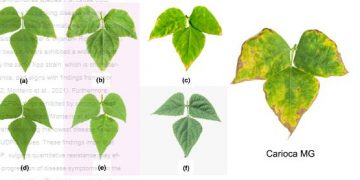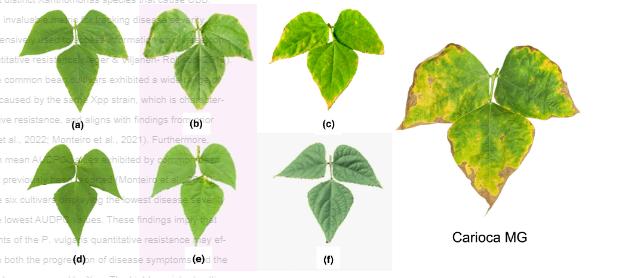Carioca and black bean groups play a significant role in Latin American common bean (Phaseolus vulgaris) consumption, serving as excellent sources of nutrients. One of the most significant threats for common bean production is common bacterial blight (CBB), a disease caused by the gram-negative bacteria Xanthomonas phaseoli pv. phaseoli (Xpp) and Xanthomonas citri pv. fuscans (Xcf). An effective method for managing this disease is the use of plant genetic resistance. However, it is not known whether the same or overlapping sets of genes are associated with resistance to both pathogens. This study aimed to identify a repertoire of genes potentially associated with resistance to Xpp and compare it with that previously reported for Xcf. Eighty carioca and black common bean cultivars that had previously been challenged with Xcf were inoculated with a strain of Xpp, and a genome-wide association study (GWAS) using single-nucleotide polymorphisms (SNPs) and disease severity data was conducted. Three carioca and three black bean cultivars exhibited high levels of resistance to Xpp. Five SNPs with the highest −log10(p) values unveiled genes coding for diverse putative biochemical functions, including a light-regulated Lir1 protein, a proton-dependent oligopeptide transporter family protein, a metallo-dependent phosphatase-like protein, a WPP domain-interacting tail-anchored protein 2 and a pectin lyase-like superfamily protein. No overlap between this repertoire of genes with that reported for Xcf was found. These findings provide important insights into genes potentially involved in the P. vulgaris resistance to Xpp and the complexity of the resistance response to CBB.
Reference: Alves, F.H.N.S., Cruz, G.C.S., Coelho, L.A.P., Sousa, A.A., Carneiro, J.E.S. & Badel, J.L. (2024) Genes putatively involved in Phaseolus vulgaris resistance against Xanthomonas phaseoli pv. phaseoli revealed by a genome-wide association study. Plant Pathology, 00, 1–11. Available from: https://doi.org/10.1111/ppa.13963































